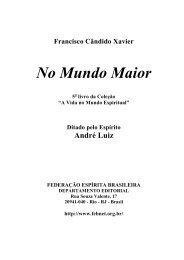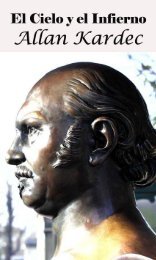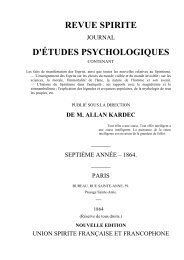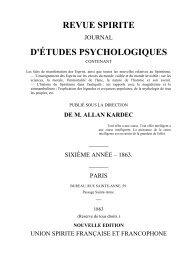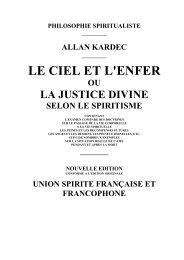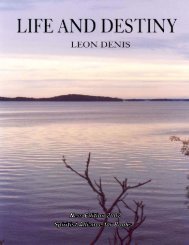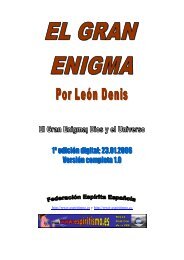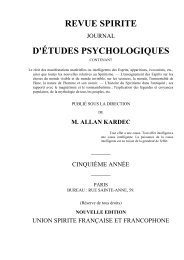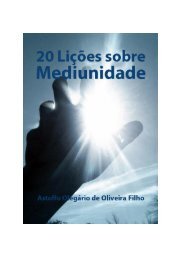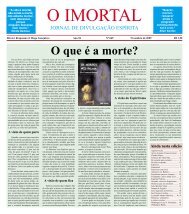PDF version - Geae
PDF version - Geae
PDF version - Geae
You also want an ePaper? Increase the reach of your titles
YUMPU automatically turns print PDFs into web optimized ePapers that Google loves.
CHAPTER XXII<br />
LIBERTY<br />
Liberty is the necessary condition for the human soul, which without it cannot build its destiny. It is in<br />
vain that the philosophers and theologians have argued this question from all points of view. They have<br />
obscured it by their theories and sophisms, condemning humanity to servitude in place of conducting it to the<br />
light, yet the idea is simple and clear. The Druids formulated it in the early dawn of history, and expressed it in<br />
these terms in the Triads: ‘There are three primitive deities, viz. God, Light and Liberty.’ At first sight the<br />
liberty of man seems to be restrained in the midst of a circle of fatalities which surround it – physical<br />
necessities, social conditions and interests or instincts: but on considering the question more closely, we see<br />
that this liberty is always sufficient to permit the soul to break through the circle and escape the opposing<br />
forces. Liberty and responsibility are correlative in man’s being, and augment with his elevation. It is the<br />
responsibility of the man which makes his dignity and his morality: without it, he would be but a blind<br />
machine – a plaything of Fate! Responsibility is established by the testimony of the conscience which<br />
approves or blames our actions.<br />
The sensation of remorse is a more demonstrative proof than all the arguments of philosophers. For<br />
each spirit, however slightly evolved, the law of duty shines like a lighthouse through the fogs of passions and<br />
self-interest. Everyday we see men in the most humble situations accepting the hardest trials rather than lower<br />
themselves, or commit unworthy actions. So if human liberty is restrained, it is at least on the way to perpetual<br />
development, for prayer means nothing but the extension of free will in the individual and in collective<br />
society. The strife between matter and spirit is precisely for this end – to liberate the spirit and to yoke the<br />
blind forces. Intelligence and will reach the place where they predominate over what we call fatality. Free will<br />
is then a flowering of the personality and consciousness. To be free, we must will to be free, and make the<br />
effort to become so in freeing ourselves from the servitude of ignorance and base passions, and substituting the<br />
empire of reason for that of sensation. That can only be obtained by education, and development of the higher<br />
faculties: physical liberation by the limitation of the appetites, intellectual liberation by the conquest of truth,<br />
and moral liberation by the search for virtue. It is the work of centuries, but at every degree of ascension in the<br />
midst of the good and evil things of life, besides the ensemble of causes and effects, there is always a place for<br />
the free will of man to exercise itself.<br />
* * *<br />
How shall we conciliate free will with divine prescience? Before this anticipated knowledge that God<br />
has off all things, can one affirm human liberty? Seemingly complex in appearance, this question which has<br />
caused floods of ink to flow is nevertheless simple in solution, but man does not love simple things; he prefers<br />
the obscure and complicated, and will accept truth only after having exhausted all forms of error.<br />
God, whose infinite science embraces all things, knows the nature of each man, and the tendencies and<br />
impulses which he will be liable to exhibit. We ourselves, knowing the character of a person, can easily<br />
foresee whether under certain circumstances he will decide to act for self-interest or for duty. Resolutions are<br />
not born for nothing, but come from a series of anterior causes and effects. God knows each soul in its most<br />
hidden recesses, and can with certitude deduct from His knowledge of this soul the determination it will, in its<br />
freedom, take. This prevision of our acts does not give them birth. If God did not foresee them, they would<br />
nevertheless have their free course. It is herein that human liberty and free will are reconciled and combined,<br />
when we consider the problem in the light of reason. The circle in which is exercised the will of man is besides<br />
too restrained to interfere with divine action whose effects move in their immensity, without limit. The feeble<br />
insect lost in a corner of the garden does not trouble the harmony of the ensemble, or fetter the work of the<br />
divine gardener, by displacing a few grains of sand.<br />
* * *<br />
106



